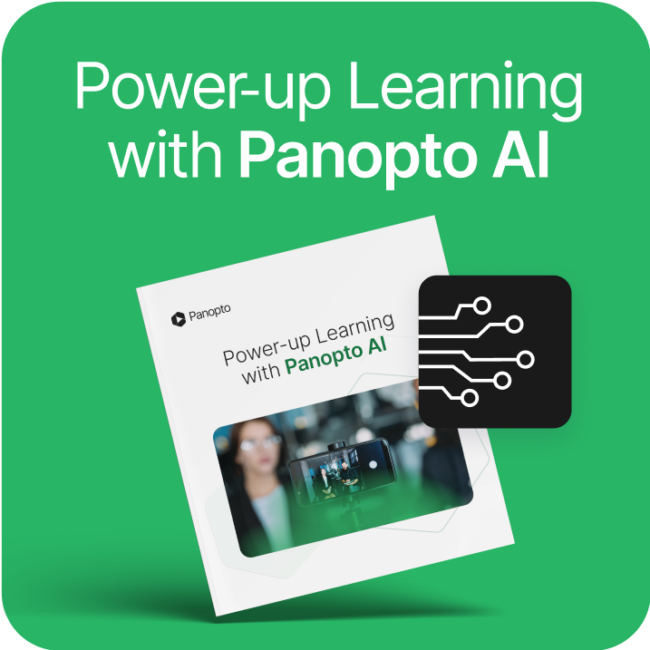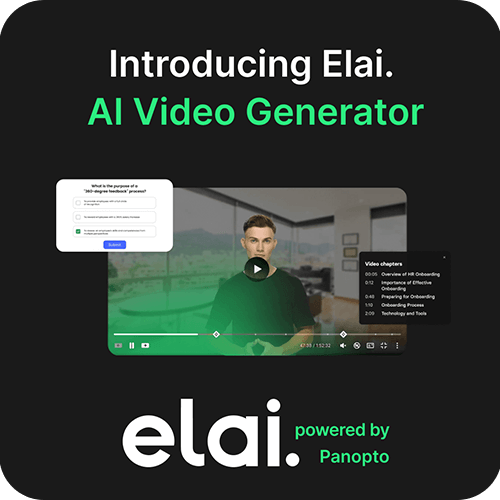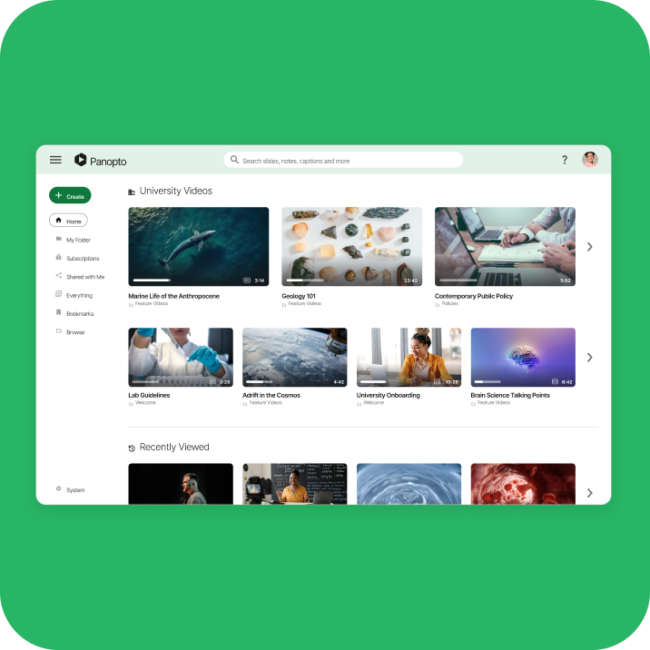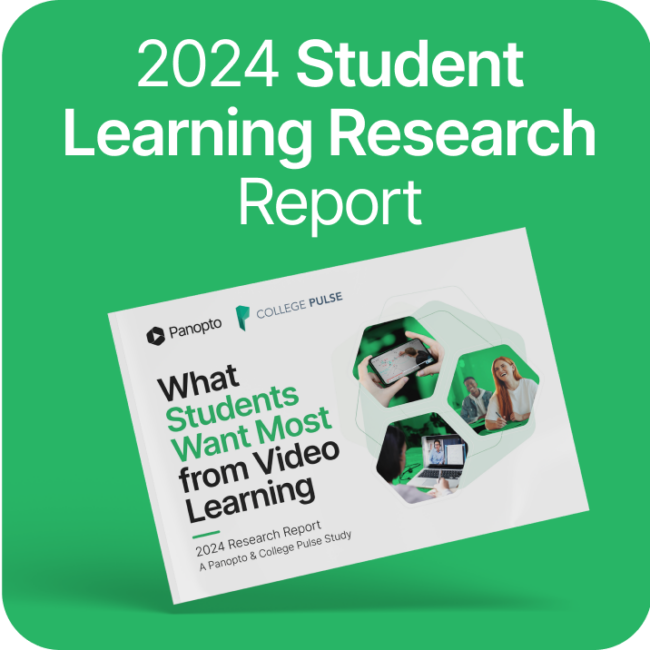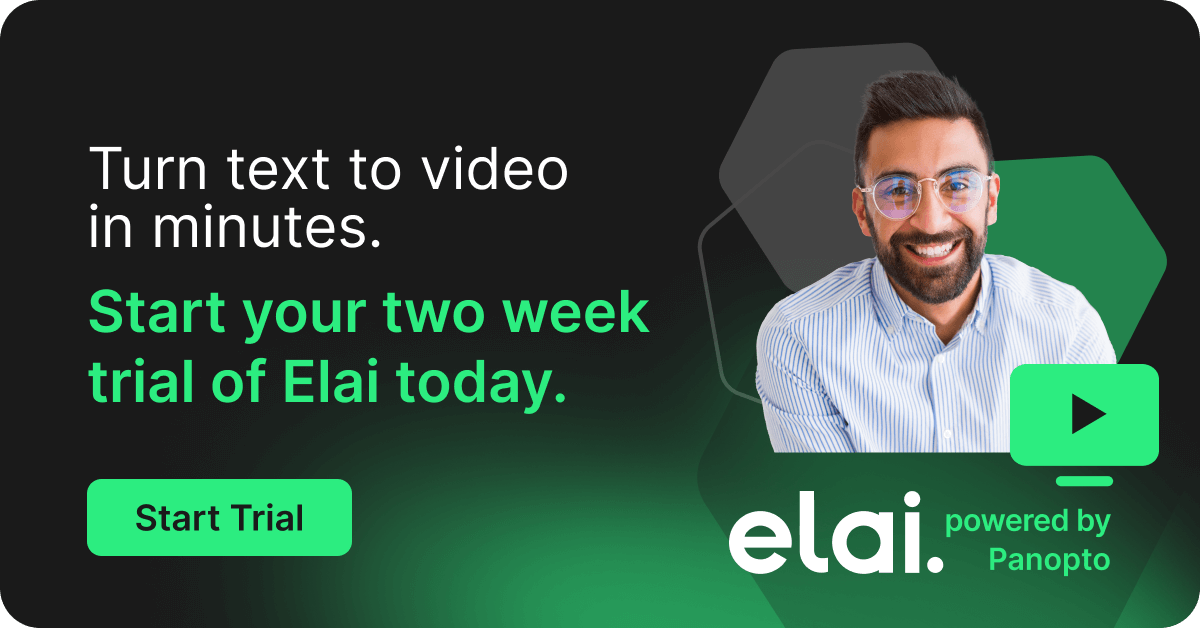- Uncategorized
This YEAR In Ideas Shared With Panopto
365 days can often feel like an incredibly small amount of time.
In academia, the calendar year may be the standard of measurement — another grade passed. But for those teaching, 12 months represents merely a couple semesters or a few quarters, barely enough time to test new pedagogies or pilot new systems. And that’s no less true for administration and staff — a year is almost the minimum timeline for campus projects and strategic initiatives, which now more commonly stretch toward 24 and 36 month horizons.
In the workplace, meanwhile, a year has now simply become altogether too short for today’s mission critical projects. In the modern enterprise there may be no employee left who isn’t working either on a development or conversion project with a 5 year timeline, or on implementing and executing the multipart, phased rollout of a new program with a 10 year growth plan.
It seems a year is just too short for our ideas. Too little time to develop them. To plan and budget for them. To pilot and implement them. To optimize and refine them.
All the more reason, then, to record them.
Because while an idea today may now lead to a decade of effort, those original inspirations are still the sparks that light the blaze. Fleeting if not captured, snuffed without the right audience.
With so many eyes focused on the future, the challenge now is to ensure that today’s ideas are seen. That essential information can rise above the fray of inboxes and activities, and that game-changing innovations don’t miss their window of opportunity for want of attention.
For ever more of us, video has become the springboard that lifts our ideas, insights, and information up and makes them visible, understandable, and engaging. It’s why every minute we now collectively create months of video, and why every day we play back years of shared recordings.
This week the Week In Ideas is celebrating our 52nd edition — the first full year of classrooms and keynotes, pitches and presentations, ideas and insights, and just about every other kind of enlightening and empowering information shareable. And to mark the occasion, we’re passing on some of our favorite recordings share with Panopto’s video presentation software over these past 365 all-too-short days.
We hope you enjoy, and more importantly, we hope these short recorded moments will inspire and inform another 12 months — and all the years to follow.
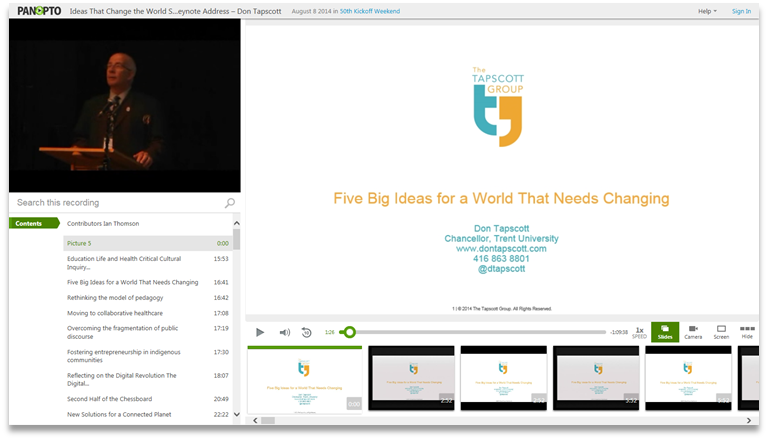
Five Big Ideas for a World That Needs Changing
Join Trent University for this recording of Dr. Don Trescott’s keynote address as part of his inauguration as chancellor. A Trent University alum and author of The Digital Economy, Dr. Trescott shares his vision for the future on five important topics — education, life and health, cultural inquiry, indigenous peoples, and sustainability and environment. His keynote looks back to history for thoughts, ideas, and answers, with an eye toward making a difference in the future.

The Right to Education: Oxford Human Rights Hub Webcast
Join the Oxford Human Rights Hub for it’s first ever live-streamed seminar! Professor Sandra Fredman, Director of the Oxford Human Rights Hub, explores the right to education around the world, asking the complicated questions of what responsibility the global community has for any given state’s ability to meet this need, whether cross-subsidised education leads to inequality, if school fees in and of themselves are a breach of the right to learning, and if in the case that parents choosing education leads to segregation, whether that creates a legitimate motive for the state to limiting it. A must-see for anyone interested in supporting access to education around the world.
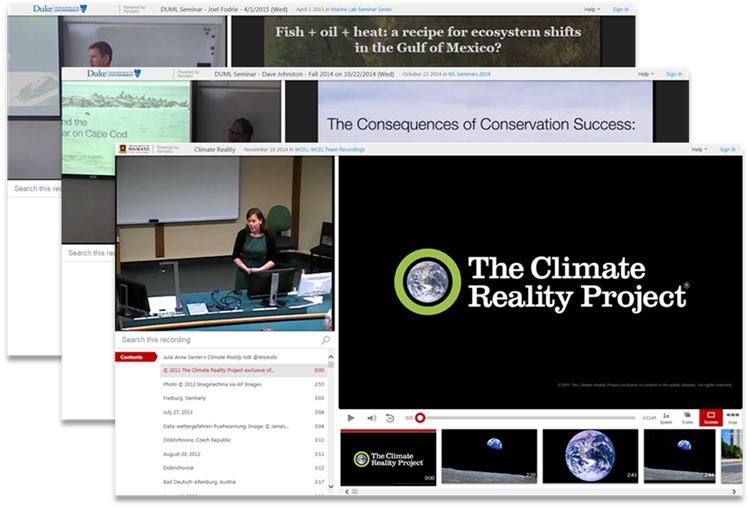
This Week in Ideas — Earth Day
The Earth is home to all of us, and it’s protection is a common cause among academic, business, and non-profit institutions worldwide. This past Earth Day we shared our 10 favorite environmental presentations shared with Panopto — from conservation to sustainability, you won’t want to miss these enlightening and empowering ecological messages.

Errors in Medicine: What Can We Do to Prevent Them?
Errors are the subject of Dr. Stephen Helms’ recorded presentation at the University of Mississippi Medical Center. There are a number of factors that may lead to an error in the practice of medicine — from psychological biases to deceptive data, Dr. Harris reviews the facts and the common causes for misdiagnoses and other preventable errors.
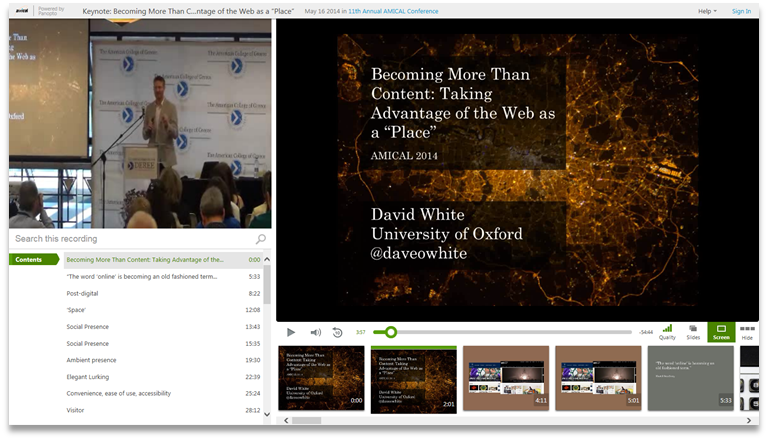
Becoming More Than Content: Taking Advantage of the Web as a “Place”
Join the University of Oxford’s David White for his keynote address at the 11th Annual AMICAL (American International Consortium of Academic Libraries) Worldwide Conference. David’s presentation, originally webcast live and available on-demand, details how the web can be used as more than a channel for information, but as a social place of residency where people can work, live, and interact.
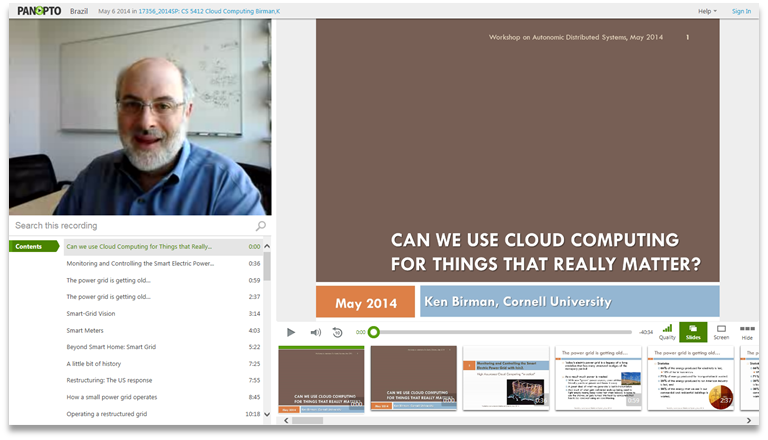
Can We Use Cloud Computing For Things That Really Matter?
Professor Ken Birman of Cornell University delves into the state of the United States’ electric power grid, and the vision for a “smart grid” in this recorded lecture. Join Birman’s classroom as he covers the potential of smart grids, smart meters, and smart homes, as well as historical and technical hurdles to the implementation of each.

Women and the Media
The University of Birmingham invites Professor Mark Foster to share his expertise on the current state of how women are portrayed in the media. Foster’s recorded guest lecture looks into the media’s “cult of youth,” and what that means for the treatment of older women in news and other programming. Foster’s talk also delves further into modern issues of feminism in the media, including coverage of the growth of women in the corporate boardroom and the “Ban Bossy” campaign.

Creating a “Flipped” or “Hybrid” Classroom to Promote Learner-Centric Instruction
Dr Ruth Anne Rehfeldt, Professor of Behavior Analysis and Therapy makes the case for the flipped classroom in this insightful recorded presentation. Dr Rehfeldt opens with a discussion on active learning, then dives into practical applications of flipped classroom styles, including potential activities for in-class and after-class time, as well as promoting engagement in online classes. It’s a sharp resource for anyone considering flipping their next classroom — or their next meeting.

Challenges Posed by Digital Assets in Estate Administration
Very few people make plans for the future their assets after death — especially digital ones. This recorded seminar on the post-death afterlife of digital assets examines how individuals can manage the full spectrum of 21st century property and the challenges posed by the digital world. Speakers James Norris, CEO of DeadSocial, Dr. Wendy Moncur, Duncan of Jordanstone College of Art and Design, University of Dundee, and Andrea Pierce, Head of Legal Services at Kings Court Trust Ltd, address everything from management of estates to controlling a person’s post-mortem identity. Whether it’s passwords, social networking accounts, or online property, the certainty of death opens up an entirely new world for living next of kin to negotiate after a person dies.

Higher Education Teaching Matters
Join Duncan Lawson, Pro Vice Chancellor Formative Education and Professor of Mathematics Education, for his recorded lecture on the importance of teaching in Higher Education. Lawson delves into the history of the lecture format, observes how today’s learners have changed, and looks into the future of the connected learner.
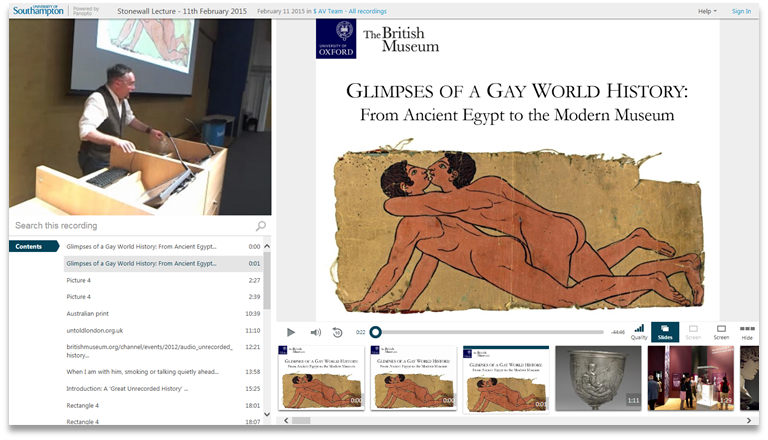
Glimpses of a Gay World History: From Ancient Egypt to the Modern Museum
The Southampton Stonewall Lecture is an annual lecture at the University of Southampton devoted to the history of homosexuality or LGBT history. The purpose of the lecture is to educate the present about the past and to showcase thinking and research about LGBT history. In this fourth edition of the lecture series, Professor Richard B Parkinson, Professor of Egyptology at the University of Oxford shares his research on same-sex desire in ancient Egyptian culture and literature, as well as the wider issue of how and why museums can represent same-sex experiences as integral parts of world cultures.
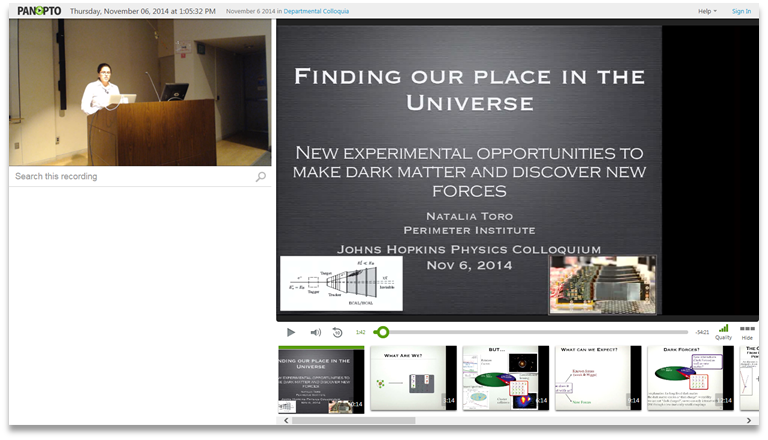
Finding Our Place in the Universe
Natalia Toro of the Perimeter Institute shares this presentation as part of the John Hopkins Physics Colloquium, looking into new experimental opportunities to make dark matter and discover new forces. Toro looks into the latest science, examining the parameters and mediators of dark forces in the universe, and offers suggestions for new research as studies continue further.
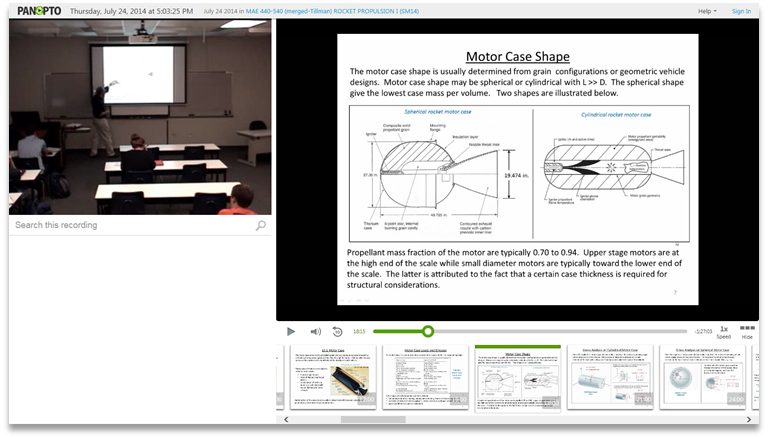
Rocket Propulsion 1
Of course, sometimes a great idea really is rocket science. For our final idea from the year, we join the University of Alabama at Huntsville for this lecture capture video on rocket propulsion. Get the physics on how motor cases, rocket nozzle design, pyrotechnic igniters and more work together to create a hunk of steel that can launch itself into outer space.
Try It For Yourself!
Panopto makes it easy for anyone, anywhere to record presentations and share them online, both as live streaming webcasts and recorded on-demand video. To see how Panopto can help you share your ideas, contact our team for a free trial today.
